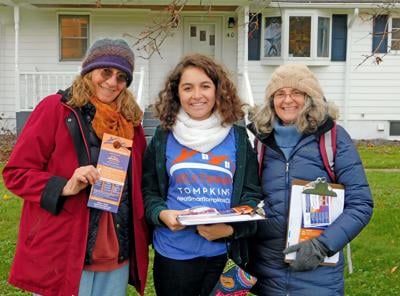No more than four years ago, Solar Tompkins, a county organization that strives to reduce greenhouse gas emissions, established the HeatSmart Tompkins program. The nonprofit program advocates for the “transition of home-heating away from fossil fuels,” according to Solar Tompkins’s website.
Since its inception, has not only grown state-wide, but also across the northeast. Currently, there is a HeatSmart Massachusetts, and a HeatSmart Arlington-Winchester, HeatSmart Carlisle-Concord-Lincoln and a HeatSmart Marshfield in the same state. There is a HeatSmart Belmont in Vermont as well.
In order to help household transition its way of heating to a more energy-efficient method, HeatSmart Tompkins deploys air- and ground-source heat pumps, along with improvements to the structures’ efficiency, such as insulation and air sealing. Program Director Jonathan Comstock said the heat pump systems can reduce a household’s carbon footprint on average by 70 percent, depending on the structure of a household.
“Any furnace or boiler can never be more than a hundred percent efficient, because the heat comes from the combustion, and if you captured every last bit of that heat, that would be 100 percent,” Comstock said. “You never do…But a heat pump can be as much as 400 percent efficient.”
“They aren’t taking the electricity and turning it into heat. That’s what a classic resistant heater does…It just takes the electricity, it runs it through a hot resistance coil that glows cherry red, but you don’t ever get more heat than the content than the energy that was there.”
Lisa Marshall also works in the HeatSmart Tompkins program. Marshall said one household in Dryden that switched from a propane heating tank to a heat pump system went from spending over $2,000 a year to about $400. Marshall is also the Lansing Project Coordinator, and is in charge of outreach to residents. She and said a household with solar panels in that area is saving even more with the transition to a heat pump system.
“We had a home tour in Lansing who had their own solar panels,” Marshall said. “They’re basically running for free. All they’re paying to get heating and cooling all year round is the delivery fee for their electricity. Their bills for hot water, heat, air conditioning total are $17 a month.”
The program recently received a total of $150,000 in grant funding from NYSERDA, which is being put towards outreach efforts to persuade residents and business owners to transition to heat pump systems in Lansing.
HeatSmart Tompkins also offers a program for low-income households to help them transition to a heat pump system in conjunction with the Finger Lakes Climate Fund and Sustainable Tompkins.
The low-income household program offers a list of incentives funded through Sustainable Tompkins, NYSERDA and NYSEG that would allow for an individual household to pay only about 14 percent of the cost to convert to a heat pump water heater. For example, the average cost of a heat pump water heater is roughly $2,800. A household enrolled in the low-income program would only have to pay about $400 when all of the incentives are applied.
“They can get this very efficient hot water heater, and then it’s cheaper to run than your regular hot water heater,” Marshall said. “It’s not just the saving money to install, it’s saving money and carbon for the lifetime of the equipment, which is really great.”
The program is available to multiple tiers of households. Eligibility for the program is as follows: a household of one can qualify if its net income is less than $47,150 a year; a household of two can qualify it its net income is less than $53,900; a household of three can qualify with a net income of less than $61,808; a household of four can qualify with a net income of less than $73,568 and a household of five can qualify with a net income of less than $85,344.
For more information about HeatSmart Tompkins program, once can visit the website HeatSmartTompkins.org or call (607) 500-HEAT. For more information on the low-income household program, once call email Marisa Lansing at marisa@sustainabletompkins.org or call (607) 272-1720.












(0) comments
Welcome to the discussion.
Log In
This is a space for civil feedback and conversation. A few guidelines: 1. be kind and courteous. 2. no hate speech or bullying. 3. no promotions or spam. If necessary, we will ban members who do not abide by these standards.